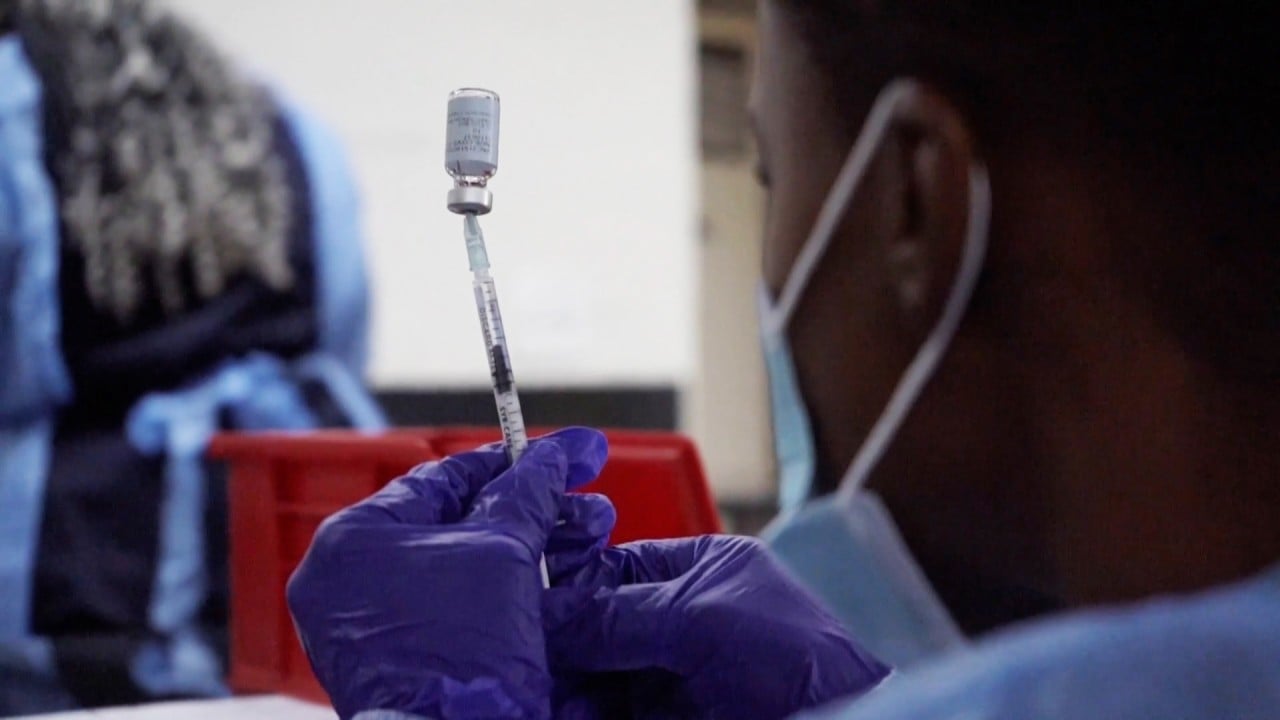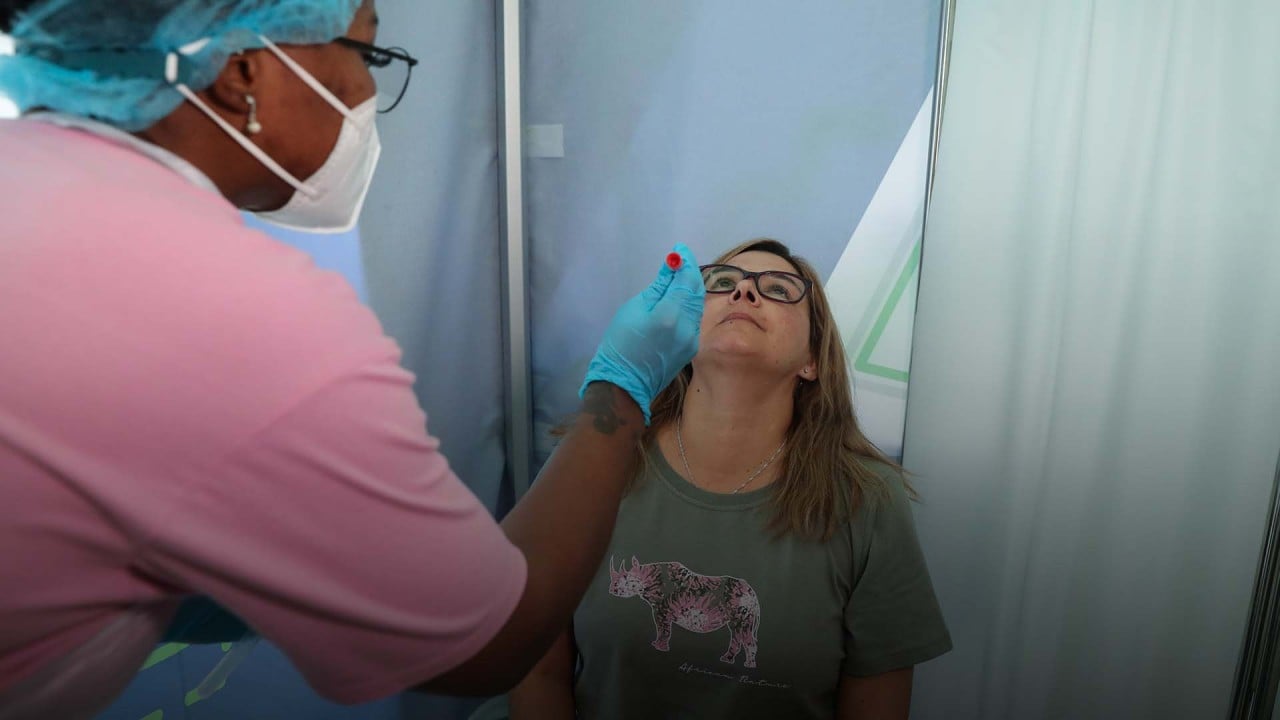
How do global banks assess Omicron risk? JPMorgan, Morgan Stanley and Credit Suisse see opportunity in ‘bump’ on road to market recovery
- Most likely scenario is a bump in the road to recovery, rather than derailing it, JPMorgan Asset Management executive says
- Morgan Stanley analysts expect further delays to borders reopening
The discovery of Omicron, the new Covid-19 strain, has brought a fresh wave of volatility to global equities, which have reacted with alarm to the WHO declaring it a “variant of concern” on Friday. News of the variant triggered heavy sell-offs over the weekend and has since erased roughly US$1 trillion off the value of global stocks.
Asian markets tumbled, taking cues from Wall Street as the Dow and S&P500 logged their biggest drops in months on Friday. Since then, about US$580 billion has been wiped out of Asian stocks, based on the MSCI Asia Pacific Index.
As investors fret over whether markets will take another beating from new Covid-19 variants, here are what global banks and fund managers have to say about the Omicron strain’s impact.
JPMorgan: a bump in the road to recovery
“Investors for some months have been pricing in a smooth path to recovery and the Omicron variant poses a new challenge to this constructive view,” said Tai Hui, JPMorgan Asset Management’s Asia chief market strategist. Market pressure could persist until medical experts have a better understanding of the virus, he added.
Sectors that outperformed during the early stages of the pandemic, such as technology services and health care, have attracted investor interest again, compared with cyclical sectors that could once again come under pressure, Tai said. Meanwhile, a short-term rotation from risk assets including equities to safe-haven assets, such as government bonds, could continue, he added.
Triple whammy? Omicron, Meituan and Macau crackdown alarm stocks investors
“The most likely scenario is a bump in the road to recovery, rather than derailing it,” Tai said, considering governments’ experience in dealing with outbreaks and scientists’ ability to alter current vaccines.
“This would imply potential opportunities for long-term investors to re-load on risk assets, but this would require greater clarification on the impact from the Omicron variant.”
Invesco: any continued sell-offs are buying opportunities
“[The Omicron discovery] does not mean we are going back to the dark days of 2020,” said Invesco’s global market strategist team. “Pharmaceutical companies have expressed confidence that they can re-engineer their vaccines to protect against it,” it said.
Hang Seng slumps to 1-year low on Omicron and Meituan woes, Macau crackdown
“Investors may maintain current allocations and view any continued sell-off as a buying opportunity,” the global investment management firm said on Monday.
The most vulnerable sectors were travel and leisure, basic resources and general retail. Assets that would suffer the most were industrial commodities, equities and real estate. “Though markets are unlikely to fall as much as in early 2020, the recent strong gains in cyclical assets suggest scope for a potential correction,” Invesco said.
Credit Suisse: an opportunity in selective and specific areas
Market volatility was likely to persist until more facts about the new Covid-19 variant were known, said Michael Strobaek, Credit Suisse’s global chief investment officer. The Switzerland-based investment bank kept equities at a small overweight position and government bonds as underweight.
Fears over new Omicron coronavirus variant send Wall Street stocks tumbling
“Risk assets such as equities are likely to give back some strength, but it is an opportunity in selective and specific areas such as endemic Covid logistics,” said Strobaek. He added that he expected pharmaceuticals to be resilient as they were more defensive in nature.
“Financial markets will be inevitably affected by bouts of volatility into 2022,” he said. “When these events bring yields down, it is an opportunity to reduce high-grade bond exposure and duration exposure. When they affect risk assets and raise the equity risk premium, it is an opportunity to take exposure to selected equities,” he added.
Morgan Stanley: delays in reopening efforts
The new Covid-19 variant poses a “near-time risk” to Morgan Stanley’s outlook on Asia going into 2022.
“However, with a much higher share of vaccinated population, the downside risk to growth could be less than what transpired in mid-2021, when the Delta variant emerged, provided that the Omicron variant is not more challenging,” a research team led by Chetan Ahya, Morgan Stanley’s chief Asia economist, said in a report published on Sunday.
Further delays to borders reopening could be expected, the report said. “[Mainland China, Hong Kong and Taiwan] have largely maintained a Covid-zero strategy, which will limit the near-term economic impact. But this means any reopening efforts will likely be pushed out further, delaying a stronger rebound in consumption growth,” it added.
UBS: add exposure to defensive stocks
The Omicron variant does not warrant a change in investment bank UBS’s view, which said that the global economy was on a road to full reopening. The road could be bumpy, but growth will be robust.
“We advise investors against making hasty changes to their strategy and recommend staying invested. We still favour adding exposure to more defensive areas, specifically health care,” Mark Haefele, UBS’s chief investment officer, said in a November 29 note.
“Exposure to alternatives can also be helpful during periods of high volatility, including in hedge funds, many of which can outperform when equity markets are falling,” said Haefele.



